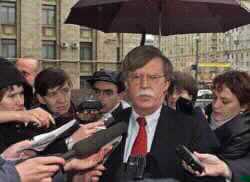- Author:
& News Agencies - Section:
WORLD HEADLINES
- Hajj & Umra WORLD HEADLINES
Moscow Hosts High-Level Iraq Talks

Russia's foreign minister played host Tuesday to a senior U.S. diplomat and the chief U.N. weapons inspector for talks on Iraq, while news reports said that Moscow was "disappointed" with a new U.S. draft resolution on disarming Saddam Hussein . Foreign Minister Igor Ivanov was to have separate meetings with U.S. Undersecretary of State John Bolton and chief U.N. weapons inspector Hans Blix that will focus on Iraq, the foreign ministry said.
The ITAR-Tass and Interfax news agencies quoted unidentified "informed" sources in Moscow on Monday as saying that the revised U.S. draft of the U.N. Security Council resolution on Iraq "differs little from previous U.S.-British proposals" that Russia and other permanent members of the U.N. Security Council didn't accept.
The reports quoted the same sources as saying that the new version didn't make good on Washington's promises to take other nations' opinions into account and reach a "mutually acceptable compromise." The Kremlin sometimes uses such anonymous sources to air its positions on important issues via ITAR-Tass and Interfax.
Deputy Foreign Minister Georgy Mamedov said Monday after talking to Bolton that the U.S. warnings about possible use of force against Iraq "don't help to create a constructive atmosphere in the world for solving military security issues."
Interfax quoted Bolton as saying that U.S. Secretary of State Colin Powell would discuss the wording of the resolution with the Russian Foreign Minister.
Russia, which holds veto power in the Security Council, has opposed unilateral military action against Iraq. It criticized an earlier version of the draft that would have envisaged the use of force if Baghdad failed to comply with U.N. weapons inspectors.
At the same time, Ivanov said Friday that the Security Council could consider authorizing the use of force against Iraq if the inspectors report "problems" in searching for weapons of mass destruction.
Along with Iraq, Bolton's two-day consultations in Moscow focused on ways to stop North Korea from developing nuclear weapons following Pyongyang's surprise acknowledgment that it had a nuclear weapons program.
Bolton said Monday that the Kremlin shares U.S. concerns about North Korea's nuclear bid and its desire to resolve the issue "peacefully and through diplomatic pressure."
The New York Times reported last week that U.S. intelligence officials have concluded that Pakistan was a major supplier of equipment to North Korea needed to restart the country's nuclear program, while China and Russia were less prominent contributors. The Russian Foreign Ministry has angrily denied the allegations of Moscow's involvement.
Mamedov expressed bewilderment about the fact that the U.S. administration waited for two weeks after hearing Pyongyang's acknowledgment to make it public, and said that Moscow would like to hear Pyongyang's version of the events.
PHOTO CAPTION
U.S. Undersecretary of State John Bolton speaks to the media after a visit to Russian foreign ministry in Moscow, Monday, Oct. 21, 2002. Bolton conferred with Russian officials in Moscow Monday about North Korea's bid to build nuclear weapons, the situation in Iraq and U.S.-Russian cooperation on strategic security issues. (AP Photo/Misha Japaridz
Related Articles
 Hajj virtues
Hajj virtues
-
School of Faith in Ten Days of Thul-Hijjah
The believing human self needs strong provocations in order to awaken whenever it is enveloped by laziness in...
-
The Status of Hajj in Islam
Hajj is the fifth pillar of Islam; Allah, The Exalted, ordained it in the ninth year after Hijrah (the Prophet's,...
-
School of Faith in Ten Days of Thul-Hijjah
The believing human self needs strong provocations in order to awaken whenever it is enveloped by laziness in relation...


 Home
Home Discover Islam
Discover Islam Quran Recitations
Quran Recitations Lectures
Lectures
 Fatwa
Fatwa Articles
Articles Fiqh
Fiqh E-Books
E-Books Boys & Girls
Boys & Girls  Hajj Rulings
Hajj Rulings Hajj Fatwas
Hajj Fatwas












